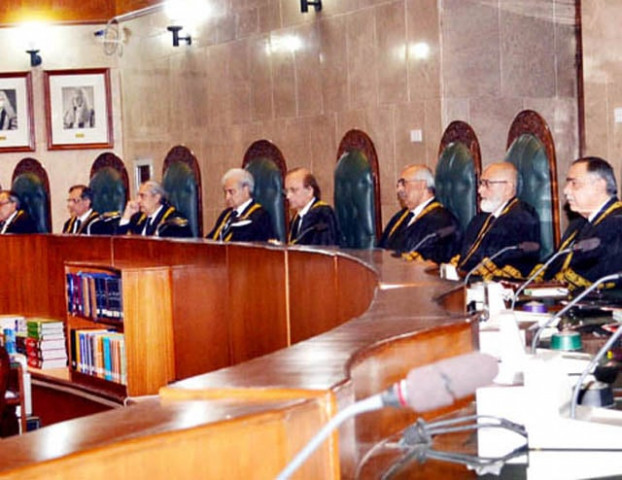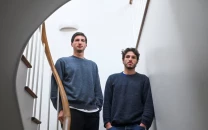Full court reference: All institutions must protect democracy, says CJ
CJ says judiciary needs to strike balance between conflicting values of national security and individual rights.

Chief Justice Tassaduq Hussain Jillani presiding over the full court reference on the eve of retirement Justice Khilji Arif Hussain. PHOTO: PID
Chief Justice of Pakistan Tassaduq Hussain Jillani said on Friday that all state institutions must protect democracy. “We must never relax in our constitutional resolve to protect the rule of law. All of us, the bench and the bar, the government and all institutions must protect democracy,” he said while addressing a full court reference on eve of Justice Khilji Arif Hussain’s retirement from the Supreme Court.
This protective role, the chief justice said, was the most sacred duty of all courts, particularly of the Supreme Court. “We have to protect the constitutional values of democracy, of religious tolerance, of human dignity and providing inexpensive and expeditious justice.”
Justice Jillani said the enforcement of rule of law was an unending struggle as the constitutional pledge of independence of the judiciary. He said the country was passing through difficult times, facing the menace of terrorism and an existential crisis. “As our country faces a multitude of battles; against terrorism; against sectarian violence and ethnic cleansing of minorities and on weakened rights for women and children, it is our duty, as a pillar of this state, to hold fast to belief in the seminal values of the rule of law, of human dignity, of tolerance and of compassion,” he said.

The chief justice said that the judiciary needed to strike a proper balance between the conflicting values of national security and individual rights. “Such [individual] rights cannot justify undermining the national security. There is an element of nihilism in the violence that we see. Fundamental rights exist only in a state where the rule of law under the Constitution reigns supreme.”
He said the apex court in its endeavour to strike a balance between the conflicting values often attracts criticism from both sides. “Those standing for human rights may contend that the court gives too much protection to security and ignores human rights; [while] those who speak of security concerns may allege that the court is tilted towards human rights rather than security. These comments should not deter us to uphold the rule of law and the canons of democracy,” he added.

Also addressing the reference, Supreme Court Bar Association (SCBA) President Kamran Mutaza expressed concern over the non-representation of Balochistan’s judges in the apex court as well as Federal Shariat Court.
He also expressed concern over the induction of bureaucrats in the establishment of Supreme Court and said that these appointments were against the rules. “The executive wants to depute their own officers in the SC on key posts and it may amount to protection of their interests,” he claimed. The SCBA president also urged the SC to set its parameters of suo motu jurisdiction, adding that the bar had been agitating this issue since long. He however, appreciated the chief justice for taking up the matters related to minorities after taking his charge.
Pakistan Bar Council (PBC) Vice Chairman Muhammad Ramzan Chaudhry urged the apex court to amend its 35-year-old rules, one of which empowers its registrar to return petitions and determine their maintainability.
“I would like to point out that the Supreme Court Rules, 1980 – framed about 35 years back – have become obsolete and need to be revised to meet present days’ requirements.”
He said corruption is rampant in the lower judiciary, adding that an efficient system to control this situation and to initiate remedial steps for eradication of corruption from the lower tier of the judiciary, was very essential.
Published in The Express Tribune, April 12th, 2014.


















COMMENTS
Comments are moderated and generally will be posted if they are on-topic and not abusive.
For more information, please see our Comments FAQ